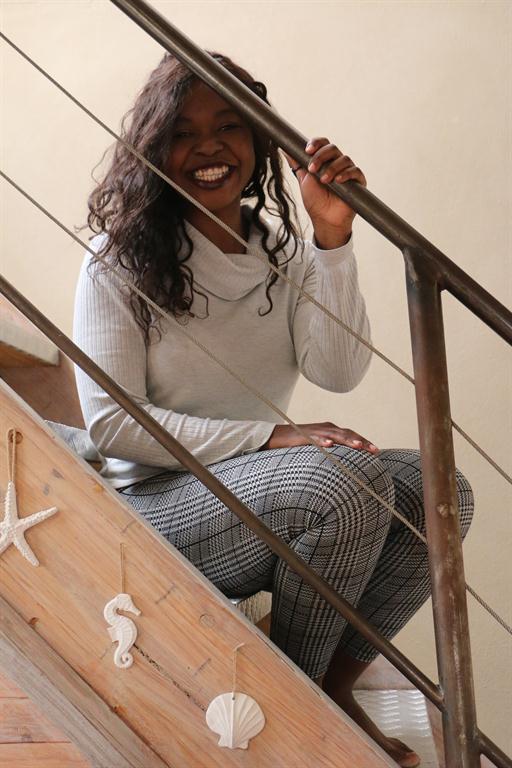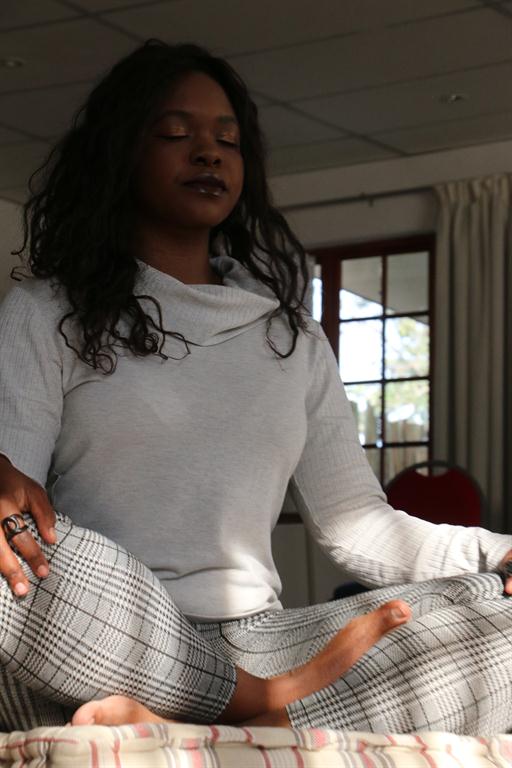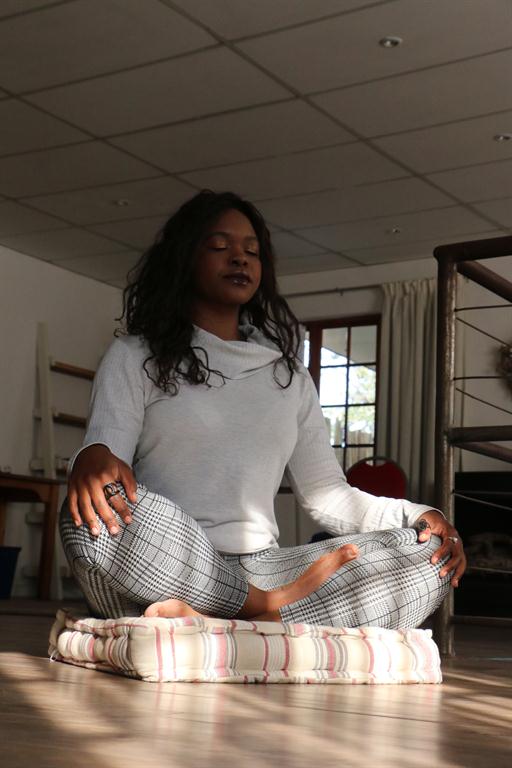Change your mind. Change your life. Change the world.
Both a gym for and a rebooting of your brain.
Henriette Lamprecht – Betrayed by someone she loved and not being able to let it go for years, Melissa Mukaiwa turned to Google for advice. Every article she read about forgiveness suggested meditation. Being raised in a Christian home, she was hesitant, but also desperate.
“I did my research and soon learned that many of my preconceived notions were confused and in other cases just wrong,” says Melissa.
She spent many months practising by herself, with limited success. Melissa then spent time in a temple in Thailand where they would meditate for up to 15 hours a day. Here she came to understand that meditation is one of the single most important skills you can learn in today’s crazy, stimulant-saturated world.
“Upon leaving the temple other tourists would see me practising and ask me to teach them. When I came home, it was much of the same, so I got my certification, started teaching shortly thereafter and have been doing so for the past six years!”
Instead of asking where meditation originated, one should ask why it’s still around today, says Melissa. “The answer of course, is that it has been and still remains one of the most powerful practices for positively transforming all aspects of our lives.”
She explains meditation is a tool used to train the mind “so that we can free ourselves from unnecessary suffering”.
“Nowadays our suffering comes in so many different hues and forms, but if we inquire honestly, we realise that all of both the positive and negative things that we see in our lives (and in the world in general), started as an idea in the mind.
“Change your mind. Change your life. Change the world.”
According to Melissa there are three main fronts on which meditation supports the modern man – body, mind and soul.
Body:
“Stress relief. When practised correctly meditation is one of the single most powerful stress-relieving tools in the world. Some forms of meditation are even up to five times more effective than sleep.”
Mind:
“An insane amount of our focal capacity is wasted lamenting about a past we cannot change or a future we cannot truly know. Practising meditation trains you to focus on the present moment and truly let go so that all your energy can go into completing the important tasks in front of you (instead of fighting imaginery battles in your head).
“Meditation also corresponds with changes in brain wave frequencies. At these levels of functioning you are more able to both identify and change limiting beliefs so you can go out into the world and actually achieve the things you say you want to.”
Soul:
“In meditation we come face to face with ourselves – the good, the bad and the ugly. Being honest about who we are naturally makes us more honest, patient and loving with everyone else.”
“It’s important to understand that meditation is not a one size fits all,” explains Melissa.
“There are hundreds, if not thousands, of both ancient and more modern types of meditation.
What may work wonderfully for one person, may be totally useless and uninspiring to another. This is why it’s incredibly important to begin your practice by consulting one or more teachers.”
Although apps are great, Melissa feels “you do yourself a huge disservice” by not leveraging the energy, nuanced insights and experience of someone who can help you realise the things you “don’t know you don’t know” so that you can develop the perfect daily practice especially for you.
Generally speaking, one can see meditation as both a gym for and a rebooting of your brain, says Melissa.
“At the beginning it may be a little difficult, but after a while you’ll realise how much of a sub-optimal level you’ve been living on.
“You will want to meditate every day because you’ll have experienced first-hand not only how enjoyable it can be, but also how it seems to make you better at absolutely everything.”
In Namibia, a popular concern is that practicing meditation goes against people’s cultural or religious beliefs, says Melissa.
“Initially, being raised in a Christian home, I had such thoughts too, but I’ve since learnt that this simply isn’t true.
“Every wisdom tradition in the world practices meditation in some way – including Christianity.”
The problem, says Melissa, is that people’s idea of the practice has been influenced by images they see in pop-culture and extreme cases where people do not approach their growth with the right understanding or intention.
“Saying that meditation is bad is like saying one should never practice any type of exercise, because there have been controversial case studies about crossfit. It just doesn’t make sense.”
Many forms of meditation are simply about focusing on universally positive states like love, peace and kindness, she explains. Others only focus on using the breath, the very cornerstone of being alive.
Because meditation forces you to really look at yourself, people also tend to shy away from the practice.
“This can be a lot for some people – especially if they are by nature very self-critical.”
That is why having a teacher to hold your hand through both the acknowledgement and the changing of our lessor behaviours is crucial, Melissa explains.
To conquer these fears, one can start by researching the science of meditation, speaking to a meditation teacher to find out if one or more particular types of meditation may work for you and trying out some practices.
“Meditation is really only tricky in three main areas: in the beginning; each time you realise something you may not have wanted to admit to yourself, and each time you break through a negative a idea that you may define as part of your self-image.”
Beyond that, Melissa emphasizes that the practice will become “one of the most profoundly rewarding, self-loving and blissful things you can do!”.
Facebook: Mel on Meditation; http://melissamukaiwa.com; [email protected]
*Counting meditation:
1. Sit in your meditation pose.
2. Close your eyes.
3. Take a few deep centring breaths to relax
4. Mentally begin counting from 1 to 10 on each breath as follows:
Inhale - 1, Exhale - 2, Inhale - 3, Exhale - 4. . . continue in this pattern until you get to 10.
This is one round.
Start at 1 each time your mind wanders off from counting or if you count higher than 10 (this means you weren’t really paying attention).
5. Try to complete five uninterrupted rounds of counting from 1 to 10, or as many rounds as you can complete in succession in 20 minutes.
Remain relaxed while counting and breathing.
[MM4]
[MM1]I wrote an article about this the other day, please feel free to read at this link:
https://www.linkedin.com/pulse/does-practicing-peace-make-you-pushover-melissa-mukaiwa/
[MM2]I added this question, I hope you don’t mind.
[MM3]I wrote an article about this the other day, please feel free to read at this link:
https://www.linkedin.com/pulse/does-practicing-peace-make-you-pushover-melissa-mukaiwa/
[MM4]I’ve also included a short pdf that covers all of the work that we do at Just Breathe.
Should be attached in the email
“I did my research and soon learned that many of my preconceived notions were confused and in other cases just wrong,” says Melissa.
She spent many months practising by herself, with limited success. Melissa then spent time in a temple in Thailand where they would meditate for up to 15 hours a day. Here she came to understand that meditation is one of the single most important skills you can learn in today’s crazy, stimulant-saturated world.
“Upon leaving the temple other tourists would see me practising and ask me to teach them. When I came home, it was much of the same, so I got my certification, started teaching shortly thereafter and have been doing so for the past six years!”
Instead of asking where meditation originated, one should ask why it’s still around today, says Melissa. “The answer of course, is that it has been and still remains one of the most powerful practices for positively transforming all aspects of our lives.”
She explains meditation is a tool used to train the mind “so that we can free ourselves from unnecessary suffering”.
“Nowadays our suffering comes in so many different hues and forms, but if we inquire honestly, we realise that all of both the positive and negative things that we see in our lives (and in the world in general), started as an idea in the mind.
“Change your mind. Change your life. Change the world.”
According to Melissa there are three main fronts on which meditation supports the modern man – body, mind and soul.
Body:
“Stress relief. When practised correctly meditation is one of the single most powerful stress-relieving tools in the world. Some forms of meditation are even up to five times more effective than sleep.”
Mind:
“An insane amount of our focal capacity is wasted lamenting about a past we cannot change or a future we cannot truly know. Practising meditation trains you to focus on the present moment and truly let go so that all your energy can go into completing the important tasks in front of you (instead of fighting imaginery battles in your head).
“Meditation also corresponds with changes in brain wave frequencies. At these levels of functioning you are more able to both identify and change limiting beliefs so you can go out into the world and actually achieve the things you say you want to.”
Soul:
“In meditation we come face to face with ourselves – the good, the bad and the ugly. Being honest about who we are naturally makes us more honest, patient and loving with everyone else.”
“It’s important to understand that meditation is not a one size fits all,” explains Melissa.
“There are hundreds, if not thousands, of both ancient and more modern types of meditation.
What may work wonderfully for one person, may be totally useless and uninspiring to another. This is why it’s incredibly important to begin your practice by consulting one or more teachers.”
Although apps are great, Melissa feels “you do yourself a huge disservice” by not leveraging the energy, nuanced insights and experience of someone who can help you realise the things you “don’t know you don’t know” so that you can develop the perfect daily practice especially for you.
Generally speaking, one can see meditation as both a gym for and a rebooting of your brain, says Melissa.
“At the beginning it may be a little difficult, but after a while you’ll realise how much of a sub-optimal level you’ve been living on.
“You will want to meditate every day because you’ll have experienced first-hand not only how enjoyable it can be, but also how it seems to make you better at absolutely everything.”
In Namibia, a popular concern is that practicing meditation goes against people’s cultural or religious beliefs, says Melissa.
“Initially, being raised in a Christian home, I had such thoughts too, but I’ve since learnt that this simply isn’t true.
“Every wisdom tradition in the world practices meditation in some way – including Christianity.”
The problem, says Melissa, is that people’s idea of the practice has been influenced by images they see in pop-culture and extreme cases where people do not approach their growth with the right understanding or intention.
“Saying that meditation is bad is like saying one should never practice any type of exercise, because there have been controversial case studies about crossfit. It just doesn’t make sense.”
Many forms of meditation are simply about focusing on universally positive states like love, peace and kindness, she explains. Others only focus on using the breath, the very cornerstone of being alive.
Because meditation forces you to really look at yourself, people also tend to shy away from the practice.
“This can be a lot for some people – especially if they are by nature very self-critical.”
That is why having a teacher to hold your hand through both the acknowledgement and the changing of our lessor behaviours is crucial, Melissa explains.
To conquer these fears, one can start by researching the science of meditation, speaking to a meditation teacher to find out if one or more particular types of meditation may work for you and trying out some practices.
“Meditation is really only tricky in three main areas: in the beginning; each time you realise something you may not have wanted to admit to yourself, and each time you break through a negative a idea that you may define as part of your self-image.”
Beyond that, Melissa emphasizes that the practice will become “one of the most profoundly rewarding, self-loving and blissful things you can do!”.
Facebook: Mel on Meditation; http://melissamukaiwa.com; [email protected]
*Counting meditation:
1. Sit in your meditation pose.
2. Close your eyes.
3. Take a few deep centring breaths to relax
4. Mentally begin counting from 1 to 10 on each breath as follows:
Inhale - 1, Exhale - 2, Inhale - 3, Exhale - 4. . . continue in this pattern until you get to 10.
This is one round.
Start at 1 each time your mind wanders off from counting or if you count higher than 10 (this means you weren’t really paying attention).
5. Try to complete five uninterrupted rounds of counting from 1 to 10, or as many rounds as you can complete in succession in 20 minutes.
Remain relaxed while counting and breathing.
[MM4]
[MM1]I wrote an article about this the other day, please feel free to read at this link:
https://www.linkedin.com/pulse/does-practicing-peace-make-you-pushover-melissa-mukaiwa/
[MM2]I added this question, I hope you don’t mind.
[MM3]I wrote an article about this the other day, please feel free to read at this link:
https://www.linkedin.com/pulse/does-practicing-peace-make-you-pushover-melissa-mukaiwa/
[MM4]I’ve also included a short pdf that covers all of the work that we do at Just Breathe.
Should be attached in the email







Kommentar
Allgemeine Zeitung
Zu diesem Artikel wurden keine Kommentare hinterlassen